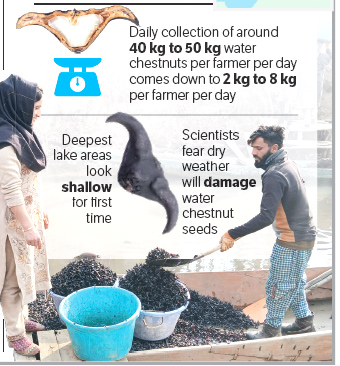Dry winter spells doom for Wular Lake’s water chestnut farmers
Bandipora, Jan 19: On Thursday, Ghulam Mohuiddin Reshi, 45, and Ali Muhammad Dar, 60, silently rowed their boat to the shore along the shallow waters of the stream passing through their village, which empties into the Wular Lake.
Wearing gloom on their faces, they had managed to pick around 30 kg of water chestnuts in the boat during a week.
Fishermen in Lankreshipora village work in the lake from Saturday to Thursday, but more men this season are returning early and unhappy.
Reshi’s other family members arrive with wicker baskets to gather the week’s produce while he uses a long wooden shaft to keep the boat still.
“More than half of the produce has rotted due to the dry season,” Reshi shares as he jumbles the spiky black chestnuts with his bare hands.
“This is all we managed to collect during a week,” he says pointing at the black-coloured water chestnuts in his boat.
This is not the story of only Reshi and Dar.
Villagers living along Wular Lake in north Kashmir’s Bandipora and Sopore echo the same concerns.

Even though the water chestnut farmers were jubilant at the summer harvest of fresh green chestnuts, the dry weather conditions in winter in Kashmir severely affected the winter harvest of mature water chestnuts.
“Water is important for the chestnuts picked in winter to retain their quality,” experienced Dar says. “Most of the water chestnuts are collected near shores, but the water is disappearing. This has destroyed the crop and even the seeds.”
Given the circumstances, water chestnut farmers say they have not been able to make 50 percent profit from the harvest.
Such has been the condition that Reshi has not been able to get new clothes for his three children while he finds daily household expenses impossible to meet.
Dar, who has nine people to feed, is equally distraught.
“Whatever I can harvest is worth nothing,” he says.
The drying up of Wular Lake during winter has been a common phenomenon for a long time now, but fishermen and water chestnut farmers say they have never seen the lake drying up this much.
The mature water chestnuts, which are harvested between November and February, are used to make flour for bread.
Given the chestnut’s exceptional health benefits, people, lately, have been using it in making cookies and other snacks.
Behind Reshi and Dar, more boatmen are making a beeline to return home.
At a small distance is recently married Bilal Ahmad, 28, who, along with his four elder brothers, has been associated with the business for 20 years.
He did not even enroll in a school and following his family’s footsteps worked in the lake since his childhood.
Bilal’s father, a fisherman, died inside his boat in Wular Lake in 2012 while catching fish.
Bilal’s brother, Abdul Majeed, says he has not been to the lake this week due to the prevailing dry weather conditions.
The extended family has nearly 20 members who depend on the lake’s produce for survival.
“If things remain the same and we don’t witness rains or snow, our situation will be worse in summer,” a worried Bilal says.
Ghulam Muhammad Lone, who lives in Zurimanz village, near the lake area considered the deepest, is surprised at how low the water levels are now.
“This has not been the case before,” he says.
The lake has huge dry patches.
The locals point out that the 4.80 sq metre dredged area out of the 28 sq metre critically silted lake somewhat retains the water level.
Villagers say that people from Zurimanz, Lankreshipora, Aloosa, Kheunusa, and Laharwalpora, who have been traditionally associated with the lake, are facing a dire situation due to the unprecedented weather conditions.
Farooq Ahmad, 32, who used to buy water chestnuts in bulk and make flour from them, said that normally water chestnut farmers collect around 40 kg to 50 kg of chestnuts a day from the lake during the period between November and February.
“This season, the harvest lasted for just a month,” he says. “For now, a water chestnut farmer collects 2 kg to 3 kg chestnuts a day and if he gets lucky, it may go up between 5 kg and 8 kg per day.”
Ahmad says that each person would make a profit of around Rs 1 lakh per season.
“Compared to that, it is almost nothing now,” he says.
Farooq, who has three children, is feeling frustrated.
He says that the weather had proved devastating for his community.
“Fishermen and water chestnut farmers are either doing other menial and odd jobs or staying idle at home,” he says.
According to the Districts Fisheries Department, 3700 fishermen are registered with it in Bandipora district.
Of the 30 villages in the district, 18 are dependent on the lake.
A scientist at Krishi Vigyan Kendra, Tariq Sultan says that the peripheral lake areas being dry had destroyed the crop.
“With cattle and birds easily picking on it, the seed too is in danger if conditions remain the same,” he says. “It was harvest time, and 70 percent of the water chestnut harvest had already been damaged. In case weather continues to remain dry, the next season will severely affect the produce and the livelihood of the people.”